Published Dec 17, 2021
How Mortal Coil Tackles the Realities of Mental Health
The classic Voyager episode helped one fan through one of the toughest nights of her life.
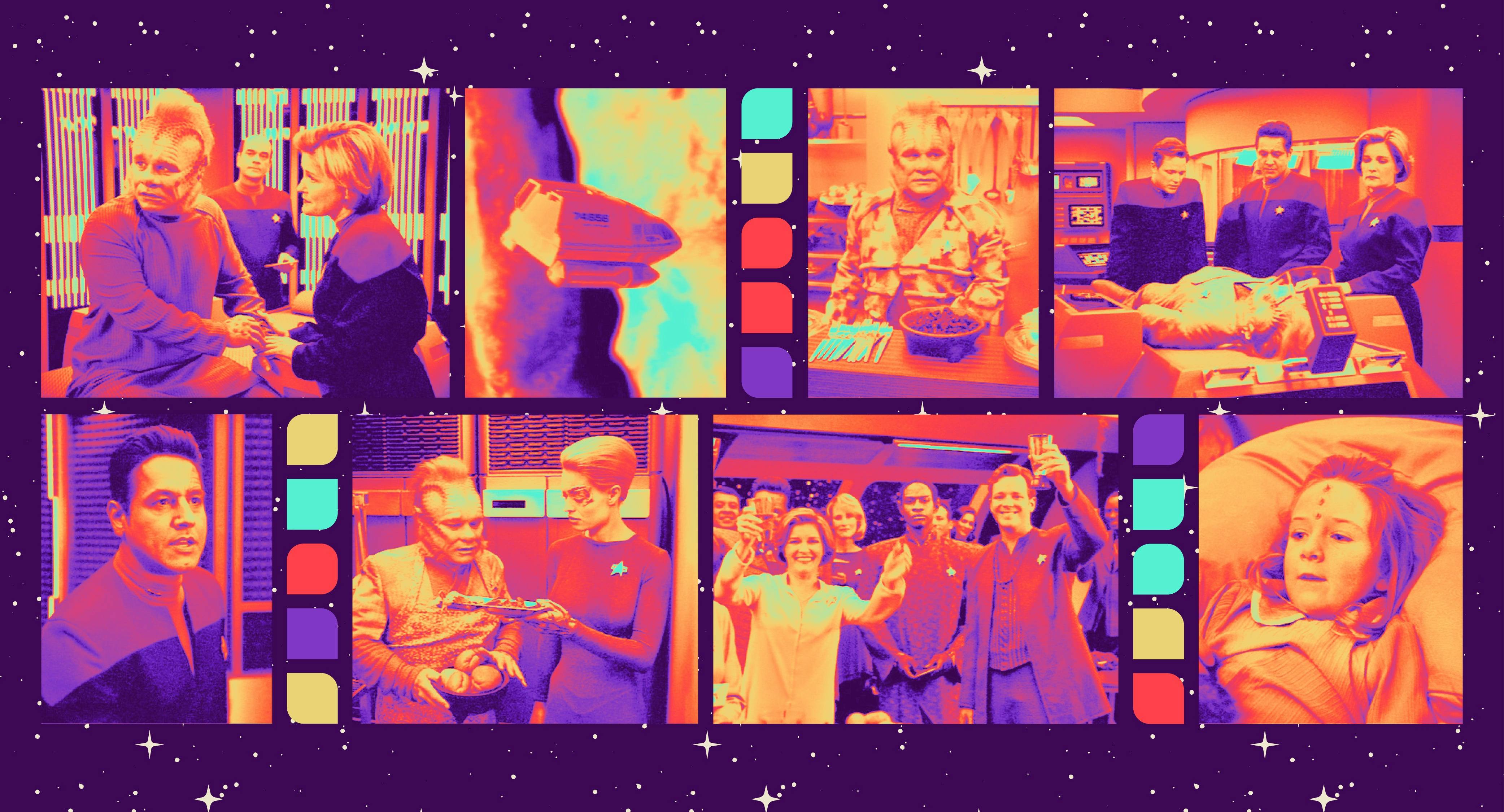
StarTrek.com
Trigger Warning: suicidal ideation
While I always enjoyed Neelix’s zany exuberance on Star Trek: Voyager, he was never my favorite character on the show. His relationship with his girlfriend, Kes, wasn’t my cup of tea for a variety of reasons. But despite my reservations about Neelix, I came to find myself identifying with him one lonely night in my late 20s. I’d recently been blindsided by a breakup, which came just weeks after a dear childhood friend died suddenly of pneumonia. My once-exciting job was turning out to be a dead end, I was drifting away from friendships that had once felt solid, and I’d been fighting a bad cold for weeks. Everything sucked.
All of this was made more difficult by the fact that I’d been living with undiagnosed and unmedicated bipolar II and complex post-traumatic stress for nearly two decades. My mental health was precarious under the best of circumstances, and now, as everything familiar and reliable fell away all at once, I was trapped in an event horizon of shame and suicidal ideation.
I’ve often felt lost amid the barbarity of our pre-warp society, but Star Trek gives me hope for a future where people treat each other with respect. Voyager is especially relevant for me because Captain Janeway was both my young-adult role model and my first queer crush. Whenever I’m feeling especially unhappy, I dive into wherever I’ve left off in my perpetual re-watch of Voyager and it always helps me through.
On this particular evening, I was white-knuckling my way through a suicidal impulse stronger than any I’d felt in recent memory. It was two in the morning and I’d already watched six episodes of Voyager. The show had become little more than a background warble and I was running out of coping mechanisms when I suddenly looked up at the screen and realized that Neelix was having the same debate with Commander Chakotay that I was having with myself: is life worth living?
The episode I was watching, “Mortal Coil," is the best episode of any Trek series when it comes to tackling suicide. There are others, of course. Voyager’s “Death Wish” handles the subject from a purely philosophical point of view, while The Next Generation’s “Half a Life” and “Ethics” tackle non-human attitudes toward age and infirmity as a means of exploring our own. But where those episodes approach suicide as a thought experiment, “Mortal Coil” addresses it in the context of trauma, which is where it usually rears its head.
In “Mortal Coil,” Neelix goes on a shuttle mission with Commander Chakotay and Tom Paris to retrieve a sample of protomatter from a nebula. The shuttle’s transporter destabilizes the nebula and Neelix is struck by an energy discharge, which kills him instantly. By the time Voyager rescues Tom and Chakotay, Neelix has been dead for more than 18 hours. But while the rest of the crew begins the process of accepting Neelix’s death, Seven of Nine proposes using Borg nanoprobes to resurrect him. Janeway gives the go-ahead and, less than an hour later, Neelix is back in the world of the living.
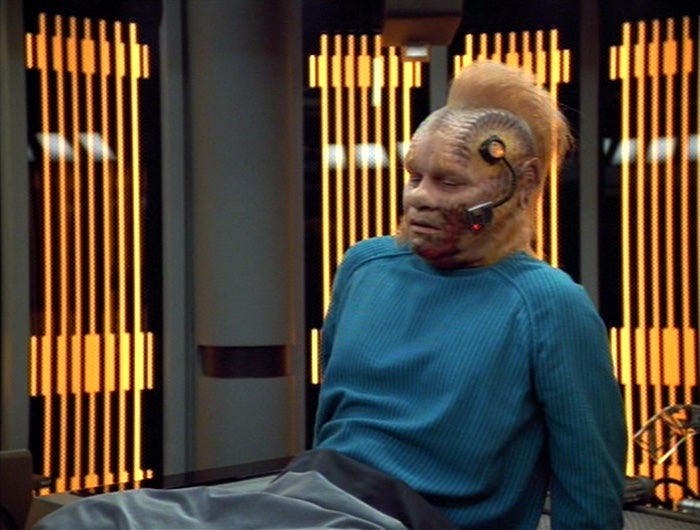
StarTrek.com
But Neelix finds himself unable to re-integrate into his old life. As the only member of his family to survive the deployment of a weapon of mass destruction on his homeworld, Neelix had comforted himself for years with the certainty that he would be reunited with his loved ones in the afterlife. But now, having been dead for eighteen hours, he believes he should have seen something of the afterlife and is greatly disturbed by the fact that he did not.
This sudden unmooring sends Neelix into a tailspin that bears all the hallmarks of post-traumatic stress. He is too overwhelmed and restless to sit with his feelings. He withdraws from everyone close to him because he cannot bear to be vulnerable with them in the face of such impermanence and uncertainty. He relives his death on the holodeck with a kind of detached bravura and pretends to his crewmates that all is well.
All of this comes to a head at the ship’s annual celebration of Prixin, a Talaxian holiday celebrating the familial bonds that Neelix now feels alienated from. Neelix tries to put on a brave face for the rest of the crew, but when Tom raises a glass to him, time slows to a crawl and their applause becomes distorted. This moment so perfectly encapsulates the greatest horror of depression. Your loved ones are supportive and even celebratory of you, but you are too detached from your own ability to feel to take any of it in.
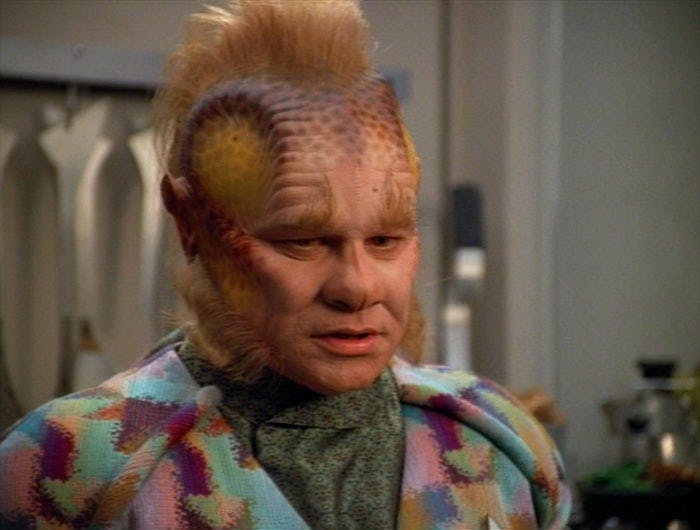
StarTrek.com
Desperate for answers, Neelix asks Commander Chakotay to help him with a vision quest which begets versions of his sister, himself, and his crewmates telling him that bringing him back was a mistake, life is meaningless, and he doesn’t belong here anymore. He awakens from the vision quest believing that suicide is his only option.
After lying to Chakotay, saying that he feels at peace, Neelix writes a suicide note and beams himself into space. Thankfully, Harry Kim notices the unauthorized transport in progress and is able to override it while Chakotay rushes to the transporter room to talk Neelix off the ledge.
“You told me you were at peace,” says Chakotay.
“I will be, as soon as I tap this control,” replies Neelix, gesturing to a tricorder that he has used to rig a site-to-site transport that Kim cannot override.
“What really happened in your vision quest,” asks Chakotay, “what did you see?”
“My sister, the crew, myself. They all told me the same thing — there’s no point in living. And I agree with them.”
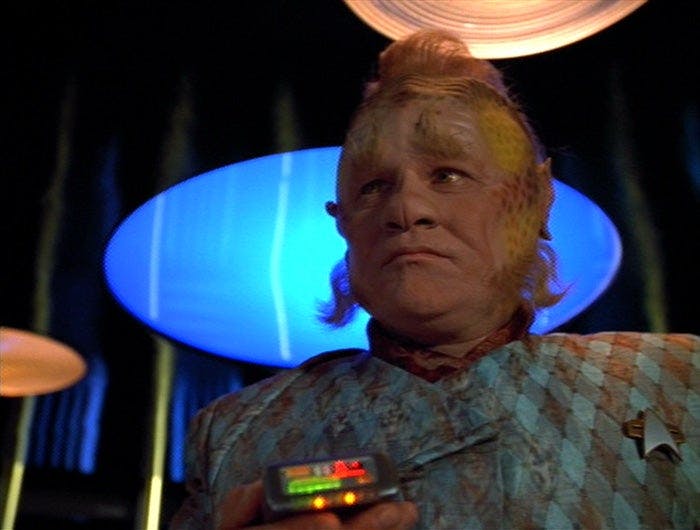
StarTrek.com
“I’m sure those were powerful images, but there are many ways to interpret them,” responds Chakotay, questioning Neelix’s thinking. “You may be coming face to face with your own fear of death, or the manifestation of your emotional crisis. Your deepest beliefs have been thrown into doubt. It’s only natural the vision quest would reflect that.”
Eventually, Chakotay challenges him again. “I understand how this can change the way you look at things. But it can also lead to an even stronger faith. You don’t know, you’re not there yet.”
Their conversation is then interrupted by Ensign Wildman, whose daughter Naomi is very attached to Neelix and needs him to check her room for monsters before bed. Chakotay tells him that life is calling him back and that the crew needs him, not just for the duties he performs but because of the way people feel about him.
Something about watching this unfold, especially the words “you’re not there yet” snapped me out of my downward spiral. I realized that I was craving certainty in a time of upheaval. Some of the people I loved were freshly lost to me and I was pushing everyone else away because I knew they could die or leave as well. I wanted to have control over that sorrow. I wanted certainty in the midst of pain. Alienation and death seemed like the only ways to find it.
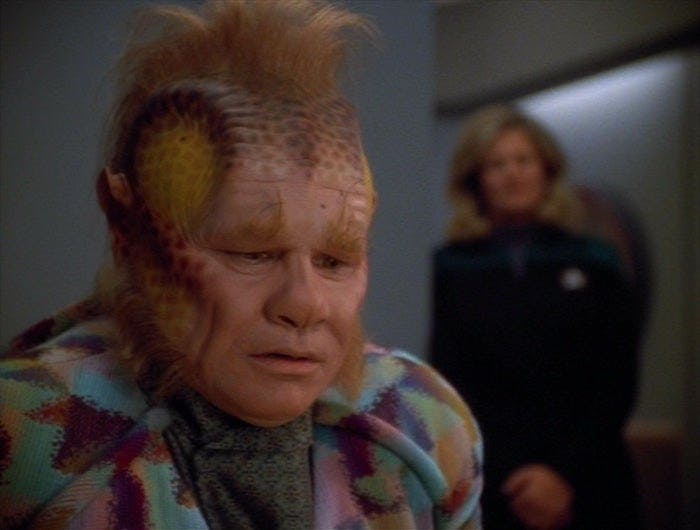
StarTrek.com
When faced with this choice, Neelix takes a deep gulp, hands Commander Chakotay the tricorder, and goes with Ensign Wildman to tuck Naomi in. He chooses vulnerability. He chooses uncertainty. He chooses to connect with people knowing full well how fragile life is and how easily it can be torn apart by an accident or an act of violence. And I knew that if Neelix could do it, so could I.
The episode wraps up with a nice little bow, the way that most episodes of Voyager do. In the episode’s denouement, Neelix acknowledges to Naomi that he was sick, but says he’s all better now. The truth of trauma recovery in the 21st century is much more complicated. It’s been nearly a decade since that moment and I’ve had my share of setbacks in the intervening years. Some were inevitable, others were self-imposed. I’ve dealt with incompetent providers and deeply seeded injustices in our mental health system. I won’t pretend that any of it has been easy, or that it’s a quick hop from asking for help to receiving it, but I’m finally properly medicated and my life is amazing. I’m so glad that I’ve continued to ask for help and choose life.
My lasting gratitude to Ethan Phillips, Robert Beltran, Nancy Hower, Allan Kroeker, Bryan Fuller, and the rest of the Voyager family for the roles they played in helping me to save my own life that night.
Star Trek History: Mortal Coil
If you are contemplating suicide, you do not stand alone. In America, there are volunteers standing by 24/7 at 1-800-273-8255 to help you talk things through. The International Bipolar Foundation has a helpful list of international suicide hotlines here. Please call. I’m glad I did.
Tae Phoenix (she/her) is a singer-songwriter, culture jammer, and community organizer from Seattle, WA. Her hobbies include obsessing over Star Trek and yelling at drivers to get out of the bike lane. You can find her at @taephoenix almost anywhere your personal data is being sold or at taephoenix.com.

